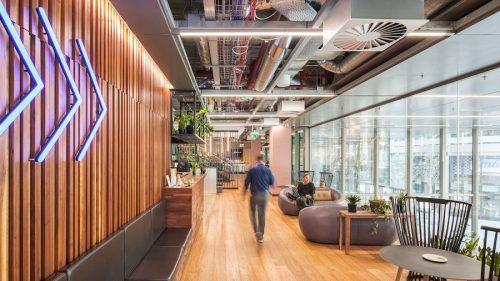Flexible office operators saying ‘don’t panic’ as WeWork enters bankruptcy

Global serviced office company WeWork has entered bankruptcy, a move that could send ripples through the UK office market.
The Wall Street Journal reported last week, citing anonymous sources, that WeWork plans to file for chapter 11 bankruptcy “as early as next week”.
Last night the inevitable happened.
The self-styled Uber of the office world, which has spaces in prestigious locations in Manchester and Birmingham city centres amongst its UK sites, has been backed by Japanese tech giant Softbank, but has seen revenues plummet globally during the pandemic, then as more people in its target range continued to work flexibly and from home offices, that trend suppressed demand too.
WeWork secures sites on a lease basis and then sublets the space flexibly. It is now likely to put pressure on landlords to reduce rents or risk a catastrophic breach.
In Manchester, Dalton Place, the former offices of KPMG, is WeWork’s first self-contained building over seven floors of workspace and is owned by Tesco Pension Fund.
Their 55,000 sq ft office suite at 55 Colmore Row in the heart of Birmingham is leased from Nuveen Real Estate who bought the site for £98m in January 2018 from IM Properties and maintained the strategy of holding out for the right occupier rather than filling the space.
It was claimed at the time that the deal set a “record headline rent for Birmingham”.
WeWork boasts 512,000 ‘members’ across serviced offices in 33 countries, mainly tech companies, but also professional services firms.
Deloitte are currently in a WeWork space ahead of a move to new purpose built offices near Victoria train station in Manchester.
The London property market has more exposure to WeWork than regional cities with 40 sites across the capital. As well as the four Manchester sites and the Birmingham location WeWork UK also has spaces in Cambridge and Edinburgh.
But flexible workspace operators have been quick to reassure the market that WeWork’s troubles are specific to them, and not a symptom of a wider weakness in the model.
Mark Dixon, founder of Regus and chief executive of their listed owner is quoted in the Telegraph as saying his brand has suffered “guilt by association” with WeWork as the share price slumped by 20% over the last six months despite a doubling a profits.
Jonny Rosenblatt, co-founder of flex operator Spacemade, which operates Park House in Leeds and 10X at Brindley Place in Birmingham, acknowledges that WeWork has done a lot of good things for the flex industry, but says its model has become quickly outdated.
“Flex workspace is far from dead,” he said, and pointed to recent research by Spacemade into the “Flex Premium” that when integrated well within the wider asset, can generate income through the flexible model, but also increase the “lettability” of the traditional floors.
Will Kinnear, founder of HEWN said the collapse of WeWork may also create opportunities.
“Should the worst happen and WeWork enters administration in the UK, Landlords have two real options, start speaking to other flexible workspace operators that can actually make the operational space work or remove the WeWork fitout and let the space in the open market. I’m already having discussions with various landlords about finding operators to move in should WeWork depart,” he said.
He also added that the sector is “booming” despite WeWork’s downfall.









